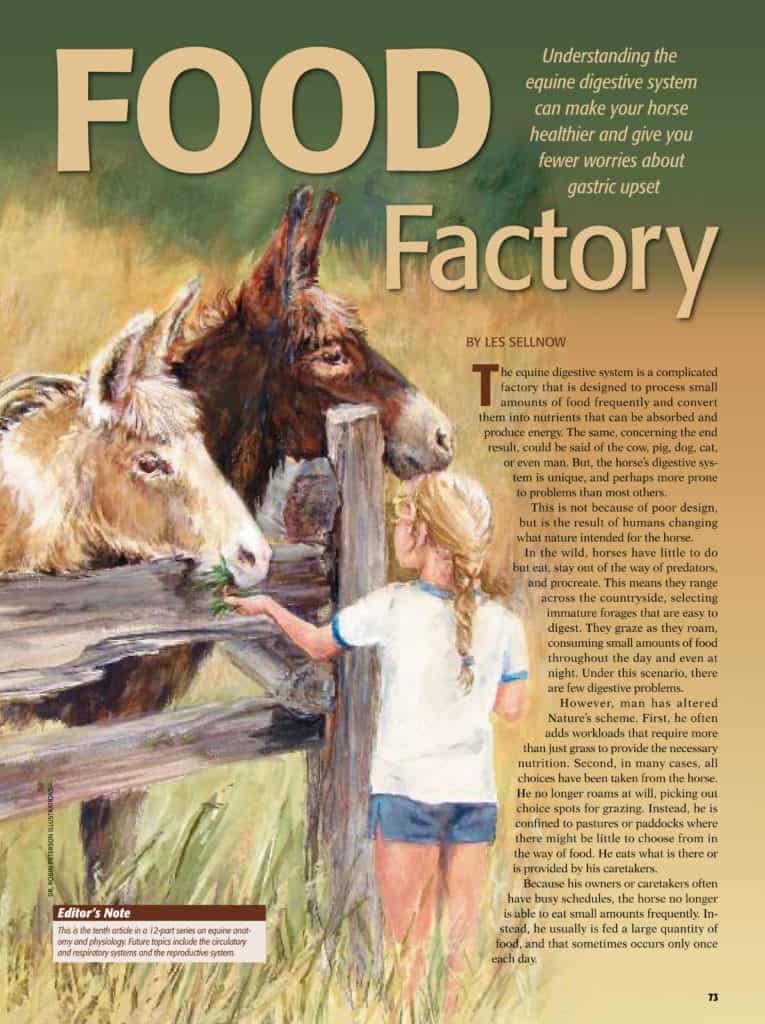Avoiding Colic Through Management
The age-old disease of colic can best by managed be returning the horse–as much as possible–to its natural environment. This means
The age-old disease of colic can best by managed be returning the horse–as much as possible–to its natural environment. This means
Veterinary surgeons at the University of Liverpool have developed a Web site dedicated to explaining the causes, prevention and treatment of colic in order to provide more
Too much alfalfa, too little oat and grass hay, and limited access to pasture grazing are important factors that put horses at risk for developing enterolithiasis (intestinal stones that have the potential to cause colic).
Further complicating the debate regarding whether or not the equine tapeworm Anoplocephala perfoliata causes colic in horses, Canadian researchers did not find evidence of a significant association between A. perfoliata infection and
How is feeding carbohydrates related to gastrointestinal (GI) disease? The propensity to feed high-grain and high-concentrate diets instead of relying on high-fiber diets has increased the incidence of colic.
One of the more exotic forms of colic is caused by enteroliths, or stone-like formations that form in a horse’s digestive tract.
Incisional hernias (protrusion of abdominal contents through a gap in an incision beneath the skin) occur in up to 17% of horses receiving abdominal surgery, reported Gal Kelmer, DVM, MS, clinical assistant professor at the University of
All animals can choke, including horses. When it happens, it should be considered a medical emergency. A horse chokes when its esophagus is obstructed, rather than the trachea, or windpipe. Although horses are still able to breathe in this
A 2008 Equine Veterinary Journal (EVJ) publication examining dehydration in working horses was summarized and printed on TheHorse.com on April 24, 2008, prior to its actual publication in EVJ. It was reviewed and approved by the researcher.
The urinary tract is a vital system; if a problem develops, it can rapidly become a crisis.
What’s the best way to feed a horse when his GI tract isn’t yet quite right after colic or colic surgery?
Up to 86% of Australian Thoroughbred racehorses have been reported to have gastric ulcers. Many factors can contribute to ulcers, and researchers at Murdoch University set out to determine which ones were the most significant for this population

Understanding the equine digestive system can make your horse healthier and give you fewer worries about gastric upset. In this article, we’ll take a look at just how this “factory” is designed and how it functions.
Sand colic due to an accumulation of sand in the intestines accounts for up to 30% of all colics, often causing weight loss and chronic diarrhea. Psyllium has often been recommended as a laxative for clearing sand out of the intestines, although
If your horse has ulcers, giving him omeprazole isn’t the only thing you can do to help reduce the severity of the problem. Noah Cohen, VMD, PhD, MPH, Dipl. ACVIM, discussed a study that found alfalfa hay reduced the severity of ulcers in young,
In the past few years, we’ve been hearing how many more horses have gastric ulcers than we used to think. We also know that oral omeprazole paste (GastroGard, manufactured by Merial Limited, Decatur, Ga.) effectively treats and prevents ulcers.
Stay on top of the most recent Horse Health news with
"*" indicates required fields